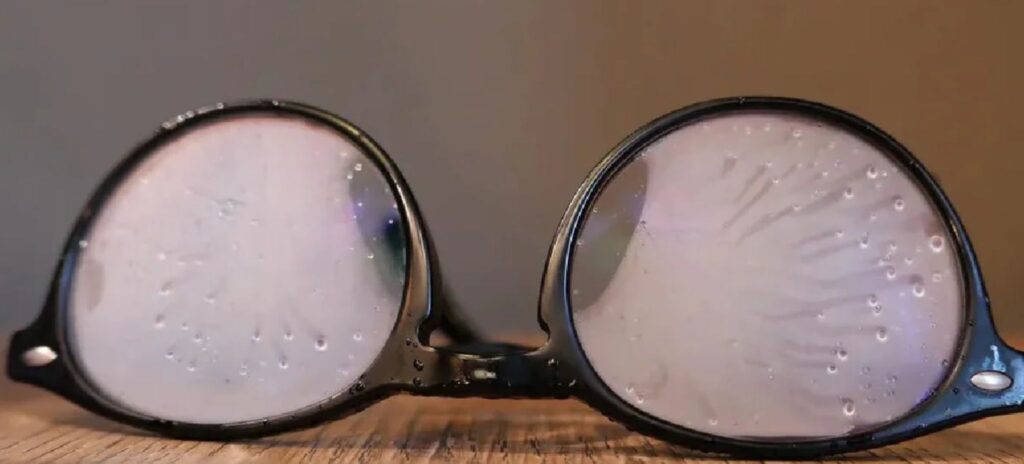Free Shipping Over £75 Orders
- 100% RECYCLEABLE PACKAGING HERBAL AND ORGANIC INGREDIENTS
Free Shipping Over £75 Orders
- 100% RECYCLEABLE PACKAGING HERBAL AND ORGANIC INGREDIENTS

Many people who wear glasses struggle with foggy lenses in their daily lives. Factors such as cold weather and mask usage can increase lens fogging, negatively impacting visual quality. If you are also bothered by your glasses fogging up, you can achieve a solution by following the recommendations we have listed.
Fogging of glasses is a common issue experienced by many users. This phenomenon typically occurs due to the temperature difference between warm and cold air. When glasses are in a warm environment, water vapor condenses on their surface, causing them to fog up. This situation is frequently observed when walking outside in cold weather or entering warm, enclosed spaces. Some factors that contribute to fogging are:
One of the main reasons glasses fog up is body heat. Body heat varies according to the surrounding temperature and affects the amount of moisture that condenses on the glasses. Especially when outside in cold weather, while our body remains warm, the cold outside air can cause water vapor to condense on the surface of the glasses.
Foggy glasses not only impair visual quality but also cause discomfort. To reduce the impact of body heat on fogging, proper mask usage, attention to environmental factors, and selecting the right lens type are important. Especially for those who exercise or sweat easily, it’s essential to remember that increased body heat can cause glasses to fog more quickly. Taking necessary precautions can make wearing glasses more comfortable.
Glasses are an essential accessory used to correct vision problems and protect the eyes. However, fogging is a problem many users face. Fogging typically occurs due to factors such as the lens structure of the glasses, the temperature of the environment, and the user’s body heat. Eyeglasses consist of two main components, the frame and the lenses.
The frame provides the basic structure of the glasses and can be made from various materials. Lightweight and durable materials such as aluminum, plastic, and titanium are commonly used in frames. The design of the frame also affects the comfort and aesthetics of the glasses. The lens structure of glasses not only allows light to pass through but also enhances functionality with various coatings. For example, anti-reflective coatings reduce glare, providing a clearer view. Some lenses also feature UV protection, which shields the eyes from harmful sun rays.
Mask usage has become an integral part of our lives, especially since the beginning of the COVID-19 pandemic. However, many people who wear glasses while wearing a mask experience foggy lenses. Fogging of glasses can be annoying as it reduces visual clarity.
The primary reason glasses fog up when wearing a mask is the interaction of body heat with moisture, causing condensation on the lenses. If your mask does not fit properly, warm air from your breath can escape from the top, causing the glasses to fog. To prevent this, ensure that the part of the mask covering your nose is well adjusted. Additionally, placing a small piece of tissue inside the mask can help reduce fogging.
As previously mentioned, the fogging of glasses can be influenced by many factors, one of which is environmental factors. When warm air encounters the lenses in a cold environment, condensation occurs. This issue typically occurs due to the temperature difference between warm and cold environments.
Additionally, high humidity levels in the environment can cause water droplets to accumulate on the lens surface. Fogging is more common in areas with low air circulation, such as enclosed spaces or narrow areas. Factors like mask usage can also block airflow, leading to foggy lenses. Therefore, choosing cool and breezy locations during outdoor activities can help protect your glasses.
Many people who wear glasses suffer from foggy lenses caused by the combination of cold air and warm breath. Fogging is an annoying situation that makes it difficult to see. However, you can easily solve this problem by following the five steps listed below.
Fogging of glasses is an issue faced by most glasses wearers. One of the most effective ways to deal with this problem is by using a lens cloth. A lens cloth is a suitable solution to prevent fogging on your lenses. These cloths are usually made of microfiber material. They also help clean the glasses without scratching the lenses. Regularly wiping your lenses will remove residues and oils from the lenses, thus preventing fogging.
Anti-fog spray is a practical and effective way to prevent your glasses from fogging. When applied to the lens surface, these products prevent the formation of water droplets, keeping your vision clear.
Dealing with fogging can be challenging for glasses wearers. This issue is especially common when transitioning from warm places to cold weather conditions. Coating your glasses with an anti-fog solution is an effective way to reduce this problem.
There are many ways to prevent your glasses from fogging, but the dishwashing detergent trick is one of the most effective and practical methods. Dishwashing detergent is known to help prevent fogging on glasses lenses. You can apply dishwashing detergent to the lenses, wipe them dry, and avoid fogging.
Glasses wearers often face the issue of foggy lenses. Although various precautions can be taken against fogging, in some cases, using contact lenses appears as the most effective solution. Unlike glasses, contact lenses are applied directly to the eyes, making them less affected by external factors. One of the advantages of using contact lenses is that they eliminate the fogging problem. While glasses fog up in warm environments or during breathing, contact lenses do not encounter such a situation. This provides great comfort for users.
You may also be interested in our article titled Bad Cleaning Habits That Do More Harm than Good.
Stay Informed About Us!



Main Menu
Cookies
We use cookies to personalise content and ads, to provide social media features and to analyse our traffic. We also share information about your use of our site with our social media, advertising and analytics partners who may combine it with other information that you’ve provided to them or that they’ve collected from your use of their services.